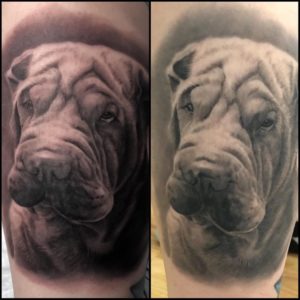Ever gotten a tattoo that was incredibly vibrant and saturated, only to have it fade or dull over time? Rest assured that it is a completely normal part of the process. Tattoos will never be AS vibrant as the day that they were initially done, that much is a common fact. All tattoos fade at a different rate, however. The rate of fading is caused by several factors. The biggest reasons being pre-tattoo skin care, general client skin type, placement/location on body, post-tattoo skin care, artist knowledge and the quality of supplies that they use.
Pre-Tattoo Skin Care
Preparing for your tattoo is just as important as taking care of it once it’s done. It is incredibly important to keep your skin’s health in mind before your appointment. First and foremost, drink PLENTY of water. Our bodies are made up of mostly water, so it is important to stay hydrated and keep them healthy. Nutrition is another factor to consider before hand. It’s wise to eat foods that will nourish your body/skin. Eating right can increase the longevity of a tattoo and help your body heal fresh tattoos better. We can’t stress the next part one bit…. WEAR SUNSCREEN.
Even if it is cloudy, the sun’s damaging UV rays can still penetrate and speed up the skin’s natural aging process and fading of tattoos. Lastly, use a moisturizing lotion – applying it thinly and evenly. Too much lotion can create a buildup on the skin’s surface, which can cause pimples/blemishes.
Client Skin Type
Skin type varies from client to client. It is important to identify your skin type in order to best take care of it, because certain skin care may work well for some – but not for others. Client skin type often goes hand in hand with pre-tattoo skin care. Certain skin types are a direct effect of daily care, or lack there of. Dry, non-moisturized skin has a tendency to be much tighter and thinner because the cells aren’t being fully hydrated. This can cause the skin to be fragile and easily damaged during the tattoo process and has an increased chance of blow-outs, fading or blurring over time. Same is to be said about tanned or burnt skin – sun exposure is never good for tattoos, before OR after.
Client Skin Type Continued – Acne
Acnes prone skin makes being tattooed and healing tattoos a difficult process. There are numerous, more serious skin conditions but acne is by far the most common among all ages. Acne/pimples are technically a miniscule infection in the skin. They can occur in nearly any part of the body, with different degrees of severity from person to person. Acne/pimples are caused by the build up of cells or oils that clogs pores or hair follicles – the body creates an inflammatory response, the ‘raised’ bit that you can feel. Most tattoo artists will not tattoo over acne because, like mentioned above, it is technically an infection. Infections are not conducive to well-healed tattoos, no matter how acute.
Tattoo Placement
When preparing for your next tattoo, there are SO many different elements to consider for a successful and long lasting piece. One of the most important, and often over looked, parts is where the tattoo will be placed on your body. Certain areas of the body are affected more by fading from friction on clothes or other body parts. Areas like the feet constantly making contact with shoes or socks, the shoulders/shoulder blades being rubbed by backpacks or undergarment/bra straps, or areas of the thighs that rub together while walking or sitting. Parts of the body that are in constant

use, such as our hands, are much more prone to fading.
Artist Knowledge and Application
You can nurture your skin as much as you want before and after being tattooed, but an inexperienced artist can still be a big threat to your tattoos longevity. You should be incredibly thorough when researching and selecting your artist. Artists that have been tattooing for years will have a better grasp on which tools are best suited for your individual idea and body and how to properly use them. An inexperienced artist may not have access to or know how to properly use the correct tools. This can cause a number of things to go awry such as incorrect needle types/sizes used, which can damage by being too abrasive, going too deep into a client’s skin causing scarring or going too shallow and increasing fading.
Post-Tattoo Skin Care
When it comes to taking care of a fresh tattoo, listen to your tattoo artist. They will be able to advise you on the best methods to care for your new tattoo. Not following proper care instructions can result in tattoos that don’t properly heal, color to pull out, or worse… infections and illness. Beyond that there are several important things to consider. As mentioned above, drink plenty of water – this helps your cells stay hydrated and healthy as they heal your fresh tattoo. Continue to eat well to nourish your body and skin. Not doing so can lessen the elasticity of skin, making it tight and dry – which is not good for tattoos, fresh or healed. Again… WEAR SUNSCREEN and use a moisturizing lotion.
While there are a million and one other factors that influence a tattoo’s fading, these are just a few of the most common.


You must be logged in to post a comment.